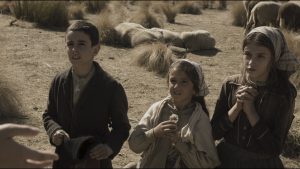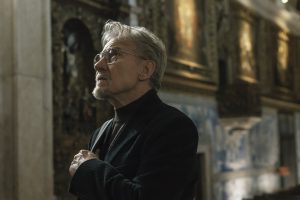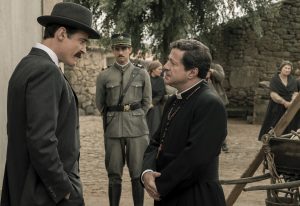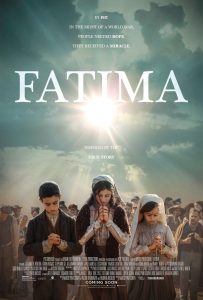‘Fatima’ extols the virtues of faith
“Fatima” (2020). Cast: Harvey Keitel, Sônia Braga, Joaquim de Almeida, Goran Visnjic, Stephanie Gil, Alejandra Howard, Jorge Lamelas, Lúcia Moniz, Marco D’Almeida, Joana Ribeiro, João Arrais, João D’Avila, Figueira Cid, Elmano Sancho, Carla Chambel, Iris Cayatte, Ivone Fernandes-Jesus. Director: Marco Pontecarvo. Screenplay: Valerio D’Annunzio, Barbara Nicolosi and Marco Pontecarvo. Web site. Trailer.
Faith is something that’s exceedingly difficult to characterize. It doesn’t have any palpable, easily identifiable qualities. It won’t conveniently fit into a neat little package. And it’s not something that can be readily recognized at a passing glance. But, for those who understand and appreciate it, its existence is undeniable, no matter how intangible it might be and how difficult it may be to convince disbelievers of its veracity. Indeed, it’s something that must be accepted on a different level, something that likely defies everything we believe is necessary to constitute verifiable manifestation, a question hotly debated in the new faith-based historical drama, “Fatima.”
On May 13, 1917, an incident took place that changed the world. In a field outside the rural community of Fátima, Portugal, three young shepherd children experienced a visionary visitation by a figure claiming to be the Virgin Mary (Joana Ribeiro). During the apparition, Mary imparted a series of insights to the three witnesses, 10-year-old Lucia Santos (Stephanie Gil) and her two younger cousins, Francisco (Jorge Lamelas) and Jacinta (Alejandra Howard). In addition, she shared information about their individual destinies, as well as instructions about what they must do in the wake of her visit (most notably, to pray the rosary more diligently and to return to the apparition site every month at the same time for the next six months). It was a remarkable event that would carry staggering implications for months and years to come.

As they witness an apparition claiming to be the Virgin Mary in Fátima, Portugal in 1917, three young shepherd children, Francisco (Jorge Lamelas, left), Jacinta (Alejandra Howard, center) and Lucia (Stephanie Gil, right) look on in awe and wonder in the new faith-based offering, “Fatima.” Photo © 2020, courtesy of Picturehouse.
Over the years, the incident would become well known around the globe, a miraculous occurrence for the faithful and a source of considerable disbelief for the skeptical. It would also be the inspiration for a number of books on both sides of the issue, including six memoirs written by the eldest of the witnesses, Sister Lucia (Sônia Braga), who would leave Fátima at a young age and go on to live her life as a Carmelite nun. As Mary’s designated representative, Sister Lucia was charged with conveying the word about the heavenly Mother’s divine messages. And so, in 1989, as yet another book was being written, this time by a skeptic, Professor Nichols (Harvey Keitel), Sister Lucia met with the author to discuss his impending work, recounting the experience in detail, reflecting on her role in it and attempting to enlighten the disbeliever about the meaning of it all.
Through a series of flashbacks, viewers witness the unfolding of Lucia’s odyssey over the period from May to October 1917. In addition to re-creations of the subsequent visitations, the film explores a variety of other developments occurring simultaneously. Of greatest concern was the reaction to the revelations of the three young witnesses. As Lucia, Francisco and Jacinta sought to explain what they saw, they were met with tremendous ridicule, most notably from Lucia’s mother, Maria (Lúcia Moniz), who harshly criticized her daughter for making up blasphemous stories. She scolded Lucia for telling false tales about the heavenly Mother, lies that she was convinced would bring divine retribution upon their family. In particular, Maria was worried about the safety of her only son, Manuel (João Arrais), who was off fighting with the Allies in World War I, a conflict that was taking a heavy toll on the young men of their community. Maria believed that Lucia’s lies could bring harm and sorrow.
What’s more, Maria was worried about what others in Fátima might think. After all, why would Mary choose someone like Lucia, an ordinary peasant girl, for a role as significant as this? Lucia’s claims, Maria feared, would make her daughter look foolish – perhaps even evil – in such a devout community as theirs.

Sister Lucia (Sônia Braga), who witnessed alleged apparitions of the Virgin Mary as a child, devotes her life to her faith as a Carmelite nun in the wake of her experience in the new fact-based religious drama, “Fatima.” Photo by Armanda Claro, © 2020, courtesy of Picturehouse.
Others concurred with Maria, such as Mayor Arturo de Oliveira Santos (Goran Visnjic), who believed that Lucia’s claims might foster public discord. As a representative of Portugal’s relatively new and somewhat shaky secular state, he was concerned with keeping order and preventing the outbreak of public hysteria. He repeatedly spoke with Maria to rein in her daughter and her proclamations, rantings that he considered sheer superstition.
Through it all, though, Lucia, Francisco and Jacinta never backed down. Whenever confronted, be it by Maria, the Mayor or even the head of the Roman Catholic diocese, Monsignor Quaresma (João D’Avila), they held to their stories. In fact, the depth of their conviction was so deep and so convincing that it earned the respect of Lucia’s father, António (Marco D’Almeida), the Mayor’s wife, Adelina (Iris Cayatte), and the local parish priest, Fr. Ferreira (Joaquim de Almeida). They even received a healthy stamp of approval from a psychiatrist (Figueira Cid) hired by the Mayor to try and get the children committed.
Perhaps most importantly, though, the children began developing a band of followers, devotees who genuinely believed Lucia, Francisco and Jacinta were witnessing miracles through each of the succeeding visitations. The children were frequently approached – indeed, over time, swarmed – by petitioners seeking to learn if the heavenly Mother had information or insights for them, particularly where missing or deceased loved ones (especially soldiers) were concerned. Such developments further raised the ire of the skeptics, but, when the crowds swelled enormously, there was little they could do to hold back the throngs of seekers looking for divine connection. This was especially true at the subsequent visitations, which attracted growing crowds and took on an almost carnival-like atmosphere, with rosary vendors eagerly selling their wares to those seeking to demonstrate their efforts at greater piety.

Professor Nichols (Harvey Keitel), a skeptical author working on a new book about the 1917 Marian apparitions at Fátima, Portugal, prepares to interview the sole surviving witness to the event in the new faith-based historical drama, “Fatima.” Photo by Armanda Claro, © 2020, courtesy of Picturehouse.
In these subsequent visits, the witnesses received additional information from the apparition, most notably prophecies that would come to be known as the Three Secrets of Fátima. The first secret was a terrifying depiction of hell, one that was foretold would impact those who failed to show proper respect to God. The second predicted that the war would end soon but that an even more horrific conflict would arise if mankind failed to stop offending God (particularly those in the newly Communist, godless Russia) by not sufficiently demonstrating their reverence to the divine. The third was to remain undisclosed until Lucia was instructed by Mary to divulge it, something that she was told would not happen until far into the future (though it was nevertheless depicted to her in a vision where a Pope and his party were walking through the destroyed streets of Rome, eventually coming upon an assassin who shot the Holy Father at point blank range).
Needless to say, the faithful were overjoyed to hear the news that the war would be ending soon, information that helped swell the crowds even more at later visitations. But, despite the vast number of faithful, there were still many skeptics who wanted definitive proof of the heavenly Mother’s identity. The children imparted this sentiment to Mary at the final visitation in October 1917, asking her if she could perform a miracle to prove her claim of divinity. And that request was apparently granted when many of the 70,000 gathered for the event witnessed the Miracle of the Sun, an incident in which the glowing orb allegedly danced and zig-zagged across the sky, even descending to the horizon, and emitting light in an array of different colors. Suddenly the statements of the children didn’t seem so far-fetched after all.
As should be obvious by now, faith (or a lack thereof) is at the core of this story. And that’s crucial, since it can work wonders, no matter how we describe or understand it, be it religiously, spiritually, philosophically or even in terms that don’t necessarily include such loftier components, such as plain old everyday kitchen table wisdom. No matter how we look at it, faith is perhaps best considered in terms of the degree of stock we place in our thoughts, beliefs and intents, for those powerful tools shape the reality we experience, the guiding principle that governs the philosophy of conscious creation.

Mayor Arturo de Oliveira Santos (Goran Visnjic, left) and parish priest Fr. Ferreira (Joaquim de Almeida, right) debate opposing views about the legitimacy of the 1917 Marian apparitions of Fátima in director Marco Pontecarvo’s latest, “Fatima.” Photo by Claudio Iannone, © 2020, courtesy of Picturehouse.
Given the backgrounds of the Fátima witnesses, it’s highly unlikely that they ever heard of conscious creation, especially since they didn’t know how to read or write before their apparition experiences. Nevertheless, they did understand the concept of faith, the principle that essentially infuses one’s thoughts, beliefs and intents with the energy that brings them into activation, be it in a traditional religious or conscious creation context. They drew upon this notion to spread the word of God as they understood it to help bring humanity back into alignment with its spiritual essence, a means to promote a greater degree of peace and understanding in a world desperately in need of it. Even if one doesn’t necessarily agree with the religious underpinnings of their message, who can realistically argue with the merits of the wider goal their work was meant to achieve?
It’s ironic that their story of the visions was so vehemently doubted. Considering that Lucia, Francisco and Jacinta were raised to be devoted followers of the Church and the teachings of Jesus, it’s more than a little incongruous that those who shepherded them into faith in these beliefs had such doubt of their own. Indeed, where was the faith of those who supposedly so strongly championed them in the first place? How could they profess to believe these notions when they refused to accept evidence allegedly confirming them? Was this hypocrisy? Or did they not possess the faith that they said they had in the first place?
In situations like this, sometimes it takes incredible circumstances to reaffirm one’s conviction in something as fundamentally incredible as faith itself. That may take the recounting of a fantastic tale from a seemingly unlikely source for the point to be made and for the connection to be re-established. But, then, faith is often seen as something inherently fantastic, so what more fitting way would there be to convince someone of its existence than a fantastic tale imbued with its essence?

Maria Rosa Santos (Lúcia Moniz) seriously questions the claim of her young daughter that she witnessed an apparition of the Virgin Mary, contending that she’s made up attention-getting blasphemous stories, in the new faith-based drama, “Fatima.” Photo by Claudio Iannone, © 2020, courtesy of Picturehouse.
I should add once more that, even if one doesn’t agree with the specific religious notions expressed here, that does not invalidate the existence and power of faith. To do otherwise, clichéd though it may be, is tantamount to tossing out the baby with the bath water. Do we really want to do that when it comes to something that can help to work miracles? We should be sure to think twice before acting too rashly.
While it’s better than most faith-based offerings, unfortunately, “Fatima” doesn’t always hit its marks as effectively as it could have. Its spiritual teachings and messages are often shrouded in vague statements, unanswered questions and unexplained imagery, and its central faith-oriented focus is relentlessly overshadowed by repetitive interrogations of the young witnesses to the Marian visitations, overemphasizing the skepticism of doubters and giving the film more of a secular tone than a spiritual one. The picture makes up for this somewhat with generally fine performances and surprisingly good production values, but, at its core, the film leaves often viewers more muddled than enlightened when it comes to what it’s attempting to say. With better handling, director Marco Pontecarvo’s latest really could have been a breakthrough offering for this genre, but, as it stands, it’s merely a modest improvement over previously released films of this type, a missed opportunity for a class of pictures seeking greater respectability, credibility and acceptance. The film is playing in limited theatrical release and is available for first-run online streaming.

When we lose our faith (or think that we have), sometimes we need reminders to help get us back on track. But we must be careful not to overlook or ignore those synchronistic prompts when they appear, for doing so may delay the fulfillment of their purpose or, even worse, push us into a deeper state of disbelief. That could be a tragedy, keeping us from seeing the miracles around us – not to mention the happiness and satisfaction that faith can bring.
Copyright © 2020, by Brent Marchant. All rights reserved.




Leave A Comment